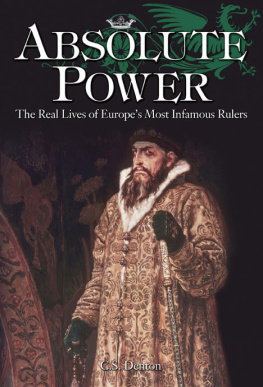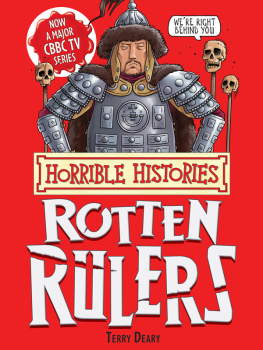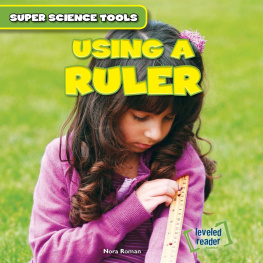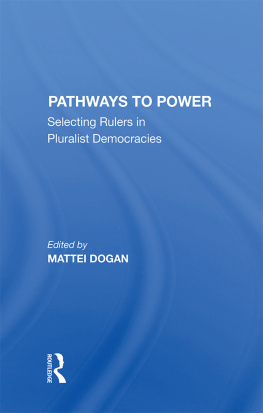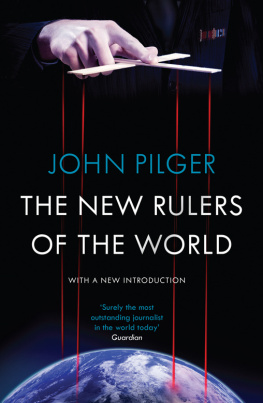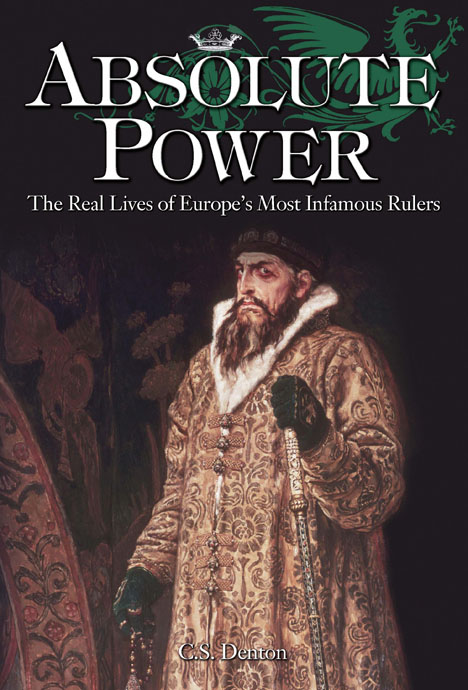
This edition published in 2011 by Arcturus Publishing Limited
26/27 Bickels Yard, 151153 Bermondsey Street,
London SE1 3HA
Copyright 2006 Arcturus Publishing Limited
All rights reserved. No part of this publication may be reproduced, stored in a retrieval system, or transmitted, in any form or by any means, electronic, mechanical, photocopying, recording or otherwise, without written permission in accordance with the provisions of the Copyright Act 1956 (as amended). Any person or persons who do any unauthorised act in relation to this publication may be liable to criminal prosecution and civil claims for damages.
ISBN: 978-1-84858-474-7
AD000016EN
Cover image: Ivan the Terrible Corbis UK
Illustrations by Barrington Barber
Acknowledgements
In the two long years this book was both a job and an obsession, many people offered me their advice and support. First I would like to thank the staff at the Alderman Library at the University of Virginia. Without their assistance and the resources there, my research simply wouldn't have made it very far. Also I thank Bruce Gordon, webmaster of 'Regnal Chronologies', and Mariusz Pazdziora's 'Sovereigns, Kingdoms and Royal Landmarks of Europe' (http://homepage.mac.com/crowns/) for providing invaluable resources of information on dates and burial sites.
Then there are my friends who provided both moral support and editorial insights: Michelle Branco, Matt Michaels, Lauren Martella, Keith Barber, Brad and Jennifer Medas, Sarah Rose-Jensen, Andre Bennett, Michael Rash, Sarah Warden, Suzanne Grub and Nathan Shumate.
Contents
Introduction
Throughout the history of Europe, all monarchs who had any real degree of power have lived with that strange dichotomy of simultaneously being human and more than human. Absolute kingship was perhaps the most unique condition into which any human being could have been born. Imagine a life with seemingly no limits on your freedom or your wealth, where honest friends are hard to find but flattering sycophants are everywhere, where you are raised from birth to believe that you embody the voice of God and the nation, and day to day live with the knowledge that anyone could turn into a traitor and at any time take your crown and your life. Under this strange life and its all too dangerous pressures, it is possible that being conditioned to rule as king, queen, or emperor was itself a cause of mental illness and all monarchs were, in their own ways, mad. After all, even the 'good' monarchs had their dark sides. Queen Elizabeth I of England nearly strangled one of her ladies-in-waiting, whose only crime was marrying without her explicit permission. Constantine the Great, celebrated for being the first Christian Emperor of Rome, ordered the execution of his own son and, later, his wife. Isabel and Fernando of Spain, besides being connected with the infamous Spanish Inquisition, exiled thousands of Jews from the country, and rebuked the Pope himself when he gave some of the expatriates refuge in papal lands. But what about the monarchs whose lives are detailed in this book?
The monarchs mentioned above were not only successful rulers, but also talented figureheads. They knew what their societies expected from them and met those demands brilliantly, making themselves into legendary figures in their own time. Today we tend to look at such a monarch as a dictator of sorts, but occupying the top of the political hierarchy was only one aspect of the role. As strange as it may seem to us in this democratic age, the core duty of a monarch was to serve as a representative of the people, a sacred duty passed directly from the hand of God. For example, in the peasant villages of Russia, the Tsar was often called in Batiushka, literally 'the Father of the Russian people', up until the twentieth century.
What unites all the figures in this book is that they had badly disappointed the high, semi-divine hopes placed on them and, because of that, they have been judged by history as a bizarre curiosity, a living catastrophe, or both. A few, such as George III, might have been well-remembered or unremarkable if not for some mental illness or psychological nightmare that transformed them into novelties. Some, like Louis XVI, were unfairly written off as tyrannical or depraved villains by propaganda, and then there were some, like Caligula, who might have rightfully earned their reputations, exaggerated as they were. Finally, there are the ones celebrated as great men and denounced as monsters in equal proportion, sometimes in the same breath, like Peter the Great or Henry VIII. All were carried away, or even overwhelmed, by their exalted status . A few were driven completely mad by it.
The great age of the European monarchs came to a halt in the opening decades of the twentieth century with the 'Great War'. If the Second World War was the bloody birth of the modern world, the First World War brought with it the dying convulsions of the old. During the course of the war, the last great dynasties of Europe the Hohenzollerns of Germany, the Romanovs of Russia, and the Habsburgs of AustriaHungary were swept away while the empires of the Ottomans, the Russians, the Germans and the Austrians were dismantled, leaving in their ruins what was quite literally a new world order.
There are, of course, still kings, queens, princesses, and princes in Europe; not only in Great Britain, but also in Norway, Spain, Denmark, the Netherlands, Belgium and Sweden, not counting smaller principalities. Yet very few monarchies today serve much more than a ceremonial role (although the Prince of the small European state of Liechtenstein recently, as of this writing, assumed considerable political power). In our time, when monarchies seem little more than tourist curiosities and democracy is taken for granted, it is easy to look at the old great monarchs as living lives out of a fantasy book, completely detached from our world and our ancestors, and it is easier to forget that for nearly two thousand years monarchy was almost the only form of government acceptable, if not imaginable, across Europe and the world. Compared to that record, democracy in Europe and elsewhere seems like only a sudden fad.
As extravagant as the personalities of rulers such as Catherine de' Medici or Ivan the Terrible may seem, they are far from unreal, but have sprung from the condition of being born or raised to a position from where they were expected to steer the fates of entire nations. These people, either through their own actions or through circumstances beyond even their control, were all condemned by the history books. In our era it is hard to imagine what it would be like to have been a prince, a king, or an emperor during the apex of monarchy, but something of our own selves can be seen in these otherwise legendary figures. Although history would have us look at them as gods, monsters or both, in the final analysis they were simply people, after all.
Chad Denton
For Cynthia Kelley
and
Theresa Kennedy
TARQUIN
'THE PROUD'
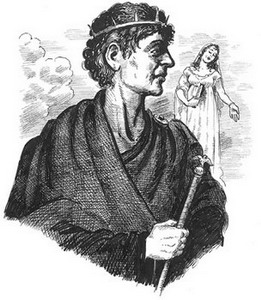
Reign:534510 BC
E ven 219 years after the legendary founding of Rome by Romulus and his entourage of thugs and outcasts, the city still had much to endure before its glory days would come around. In the sixth century BC, the city that would crown an empire spreading from the Atlantic Ocean to the Caspian Sea was itself under the boot of the Etruscan people. Only bits and pieces about the long extinct Etruscan civilization are known, because once Rome found itself in power, the vindictive Roman people would demand nothing less than the complete obliteration of even the memory of their former conquerors.
Next page
